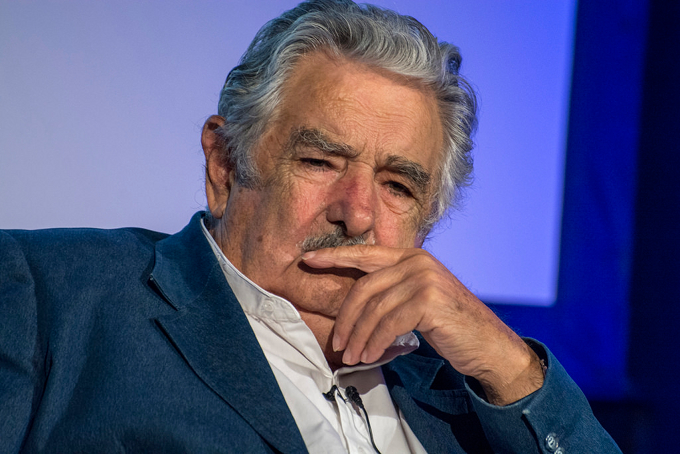
Habla Pepe Mujica
~ ~ ~
Estos anuncios son interactivos. Toque en ellos para seguir a las páginas de web

I am not a big fan of Thanksgiving. I prefer to thank the Lord through my prayers, not by eating some poor bird that has one chance in 20 million of being ‘pardoned’ from the axe by President Trump. Nor will I beat the bushes for bargains at the mall, or herd into my home the same relatives whom I purposely avoided most of the year.
Faith, action, and spirituality
Yet, I still celebrate Thanksgiving. But I treat the event in the way that Christ teaches us: through my Faith, Actions, and innate Spiritually. This is all laid out in Luke 10:38-42 when Jesus and his disciples ‘dropped in’ to see Martha and Mary:
38 As Jesus and his disciples were on their way, he came to a village where a woman named Martha opened her home to him.
39 She had a sister called Mary, who sat at the Lord’s feet listening to what he said.
40 But Martha was distracted by all the preparations that had to be made. She came to him and asked, “Lord, don’t you care that my sister has left me to do the work by myself? Tell her to help me!”
41 “Martha, Martha,” the Lord answered, “you are worried and upset about many things,
42 but few things are needed — or indeed only one. Mary has chosen what is better, and it will not be taken away from her.”
Mary’s faith, actions, and spirit transformed Jesus’s visit into an intimate, moment of love and sharing. During Thanksgiving we affirm our faith in Christian values, if only for a day, and ignore the bloody history surrounding our forefathers’ treatment of native people.
Sadly, our better nature doesn’t always prevail at Thanksgiving. Try this challenge to test the Bible’s admonition to — “Do unto others as you would have them do unto you.” When driving down the Cinta Costera during rush hour. See if you can give five motorists the right of way without getting beeped off the road.
Thanksgiving facts and fables
Ah, and then there’s the “fake news” we are asked to gobble at Thanksgiving. Historians know the first Thanksgiving never took place at Plymouth Rock in 1621 with local native tribes joining in to celebrate a bountiful harvest produced by hard-working Pilgrims. The truth is that the first Thanksgiving was celebrated by an English pirate/explorer named Martin Frobisher while holed up in Canada’s frozen north (near Baffin Island in the Northwest Territory) in 1578. Others point out that celebratory harvest feasts were common thousands of years earlier. In 1957, Canada proclaimed Thanksgiving as a national holiday the second Monday of October each year, while Americans recognized the holiday in 1863 as a stratagem to unite the country during the Civil War (the fourth Thursday of November).
The colonists weren’t in a celebratory mood in 1621 due to the poor harvest wherein many starved and others survived mostly by robbing native graves for the corn they contained. The colonial character was also marked by indolence and theft that Plymouth Colony Governor William Bradford decried in his diaries published in England. He wrote: “The crops were small because “much was stolen both by night and day, before it became scarce eatable.” He added, the colony was riddled with “corruption,” and with “confusion and discontent.”
Colonists starved for years because they wouldn’t work in the field. Another factor was that the Pilgrims were practically all indentured servants who had to export to England most of what they produced to pay down their contracts. It wasn’t until a few years later, after England had given up some of the fur trade that the colony became self-sufficient.
Celebrate through good works
Celebrate quietly at home, with a good book, the Bible will do, or pass the day with a few friends and family members whose company you still enjoy. If you do go out, visit the sick, volunteer at the food bank, sing in the church choir, or take a homeless person to Niko’s.
Don’t under-estimate the value of doing these things as a way to thank the Lord and crystallize Christian virtues, while forever changing people’s lives.
I know. It changed my life completely
Growing up as a street urchin running the streets in Washington DC, where my mom depended upon the local food bank and a small monthly welfare check after my dad’s lingering death from cancer left us penniless. Thanks, to my small paper route and the kindness of my African-American subscribers, I always had a turkey meal spent with a family somewhere along my paper route.
And have you ever spent the holidays in a hospital, or even a weekend? Not hell — purgatory. Yes, purgatory, in the sense that you are alone, with no place to go, and not knowing when you will be released.
Hospital staff, doctors, and technicians may be out of town — in December, celebrating Christ’s birth with Santa Claus under a dead tree decorated with lights and a mistletoe hanging in the hallway authorizing a drive-by kiss attack, or in April, mixing in a blender the story of Jesus’s Resurrection along with chocolates, soft bunny rabbits and hard-boiled eggs.

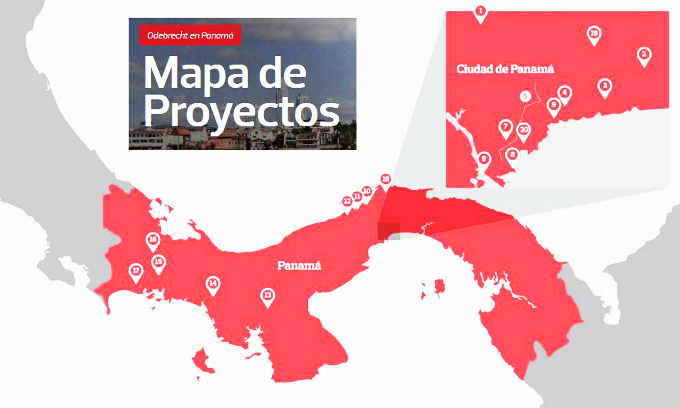
Once upon a time, in one of those “copy the gringo technology” crazes that occasionally afflict Panamanians, asbestos insulation was incorporated into a lot of Panama’s public buildings, as it was in a certain period of the old Canal Zone building practices. This reporter spent part of his childhood growing up in what had been a World War II era Navy officers’ quarters, a building whose pipes and roof had been insulated with asbestos, a naturally occurring fibrous rock.
By the time that the building — a magnificent three-story structure, with walls like those of a bomb shelter — was reverted to Panama pursuant to the Torrijos-Carter Treaties, the world had learned something about asbestos. It was a hard lesson largely at the expense of builders in the US Navy yards, which had installed a lot of asbestos to retard the spread of fires on warships, from compartment to compartment or through their electrical systems. Years later these workers began to die in great numbers from a special sort of cancer, mesothelioma, which it was determined is a common result of human exposure to asbestos fibers. Panama tore the house down rather than rid it of the asbestos.
It also turned out that a few of Panama’s older public schools had asbestos insulation built into them, that when the problem became known that these tended to have the carcinogenic fibers encapsulated with various paints or sprays, and that later when governments and their pet contractors changed there were some instances of the encapsulating material being ignorantly cut away in the course of maintenance or renovation work. To anyone who got mesothelioma it would be a huge problem, but in terms of the numbers of school buildings and people affected, it was a relatively small matter.
In the meantime, Panamanian school construction standards changed. To protect from tropical sun’s rays, a lot of public schools had fiberglass insulation installed in their roofs or ceilings. Done right, it’s all quite manageable. Hire somebody’s cousin who knows not to do installation or maintenance and the glass fibers can get into the classroom environment and they can be quite the irritant, especially to the eyes. Still, nothing to compare to the health risk posed by asbestos.
In 2004 the PRD administration of Martín Torrijos came to power and the Ministry of Education was doled out to cliques who more or less considered their appointments a license to steal. Two education ministers, Belgis Castro and Salvador Rodríguez, eventually beat their raps but each went to jail for a time. Part of Balbina Herrera’s San Miguelito entourage went to jail over separate pillages of the public schools.
One really big scheme depended on Panama’s truly awful educational level, which has become worse since then. In the public mind fiberglass and asbestos insulation were conflated. Might it be a matter of some urgency to remove asbestos from school buildings? Surely that, or at least making sure that it was well encapsulated. Protecting students and teachers from fiberglass exposure was also important, but far less urgent. However, a great hue and cry issued from the Torrijos administration about the threat of fiberglass. The schools let out many millions of dollars worth of contracts to favored businesses to remove fiberglass from the schools. Including from schools that never had any fiberglass, nor any asbestos either. Large sums were paid for work that was never done, in some cases was never there to be done.
One of the companies favored by the administration of Martín Torrijos Espino was Constructora Total SA. The company and its owner, Jorge Enrique Espino Méndez, got a $200,000 contract for fiberglass removal from schools. Mr. Espino was called on the carpet in the investigation. He said that while his company got the contract, it never went into effect and no payment was made, as by the time that it would have Belgis Castro was in deep trouble over the program and its abuses. In any case, Espino was never formally charged with anything, much less convicted. He also denied any familial relationship with the president at that time, despite the latter’s similar maternal surname.
Family ties have, however, been important for Jorge Espino. His father, Nelson Espino, was one of the professional / civil servant apparatchiki who formed the civilian infrastructure of the military dictatorship. In Noriega times he was the mayor of Panama City. A civil engineer and surveyor by trade, he served various PRD governments as minister of agriculture, director of Catastro and of the Agrarian Reform office, head of the IDAAN water and sewer utility, man in charge of the metro area’s solid waste management and the top regulator of privatized public utilities. But in the reported scheme of things, Jorge Espino’s important tie was not with President Martín Torrijos but a friendship with Minister of Education Belgis Castro.
Nilson Espino was one of the Norieguistas who avoided great disgrace when the dictatorship fell in the 1989 US invasion. Any government archives that might have suggested that this treatment was too nice have been carted away by the US Army and held under lock and key ever since. And after the crushing defeat of Balbina Herrera and the PRD in the 2009 elections, Jorge Espino, like all the ex-PRD transfuga legislators, was one of those survivors who forged a profitable relationship with the new regime.
Did Noriega’s former prosecutor in charge of shutting down the opposition press, Alejandro Moncada Luna, move right into the Martinelli ranks, rise to the presidency of the Supreme Court, and use that position for overpriced no-bid or rigged-bid courthouse construction or renovation contracts, taking kickbacks and then laundering the assets before putting them into luxury real estate and so on? Indeed he did. Surely he took more than most of the legislators and others who jumped from the PRD to the Martinelli camp.
(Will Mr. Moncada Luna, now a resident of the El Renacer Penitentiary in Gamboa, accuse this reporter of a crime for saying that he did that? It would not be the first time that Moncada Luna prosecuted yours truly for criminal defamation. Moncada Luna lost that 2006-2008 case. But of course, in the often fictional land of the Panamanian legal system, the gist of criminal defamation is to accuse someone of a crime that it can’t be shown that she or he committed. Mocada Luna copped a plea in his trial before the National Assembly, part of the deal being that in exchange for accepting guilt for, while holding public office, amassing millions of dollars worth of assets whose legitimate provenance he could not show in exchange for all other criminal charges against him being barred. So will we now hear that since charges can’t be brought, those crimes never happened? We should expect to hear such future arguments from at least some of Martinelli’s thugs.)
Moncada Luna did not work alone. Allegedly, his bogus contracting and money laundering gang had more than a dozen members, including some high profile ones like the former vice president of Panama during the PRD administration of Ernesto Pérez Balladares, banker and businessman Felipe “Pipo” Virzi and a member of the Panama Canal Authority board of directors, Nicolás Corcione Pérez Balladares. Charges were brought against 14 people, including Jorge Espino.
Espino moved to protect his interests. He sang his song about Moncada Luna and Corcione to prosecutors, giving evidence that would likely be damning to the ACP director and lighten his sentence. It was all conditional, of course.
In September of 2016 a three-judge appeals court panel ruled that because Moncada Luna copped a plea that barred his prosecution for anything else, that plea bargain protected all of the hoodlum ex-magistrate’s accomplices for all of the crimes they committed together. Proving that this was a purchased judgment will probably be forever impossible, but it’s hard to see much chance of it being anything else. There was no foundation in the law for this decision. But it did get some of Panama’s richest people and some prominent members of this country’s political caste off of the hook. Jorge Espino walked along with his co-defendants, including the ones whom he had betrayed.
Fast forward a little more than a year. Witnesses from the Brazilian-based international hoodlum corporation Odebrecht, plus a paper trail, say that Jorge Espino was the well paid conduit for bribes paid to one of Ricardo Martinelli’s public works ministers, Jaime Ford. The allegation is at least $1.8 million in Odebrecht money routed through a shell company’s bank account in Andorra, the beneficial owner of said company and account supposedly Jaime Ford. Espino was charged, briefly jailed, then let out on bail. Prosecutors flipped him to become state’s evidence.
But would Attorney General Kenia Porcell forthrightly say such a thing? Why would she want to ruin the business career and reputation of such a fine upstanding citizen as Jorge Espino Méndez? Notwithstanding her promises to reveal the names of those who took bribes from Odebrecht, prosecutors did not contest a defense motion before Judge Óscar Carrasquilla to close the plea bargain hearing and conceal the identity of one of at least 43 people identified as participating in Odebrecht crimes in Panama.
The November 20 hearing was for Jorge Espino. He agreed to pay back, in installments, $1 million for the bribe that he took. He has given or will give testimony that likely will implicate others. The deal gives him a 42-month prison sentence, which might sound severe enough except that such a prison sentence, being for less than four years, may be avoided by paying a $1 per day fine. That is, $1,275 instead of jail time.
So what kept Espino from going on to his next business venture without anyone being any wiser? More than anything, leaked pleadings on Ford’s behalf attacking Espino as a convicted criminal whose testimony is not to be trusted. Anonymous sources at the courthouse also told La Prensa. So much for “witness protection.”
As one might imagine, Panama’s anti-corruption activists are fairly livid about the whole procedure and the light sentence. The $1 million payback suggests that there was more money and were more transactions than are featured in the allegations that are now in public circulation. But then, part of impunity is the ability of criminals in high places to play information control games that allow them to dismiss both the known and the apparent as mere speculation.
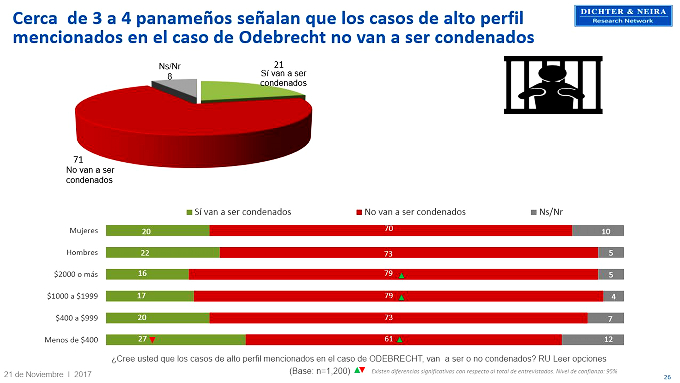
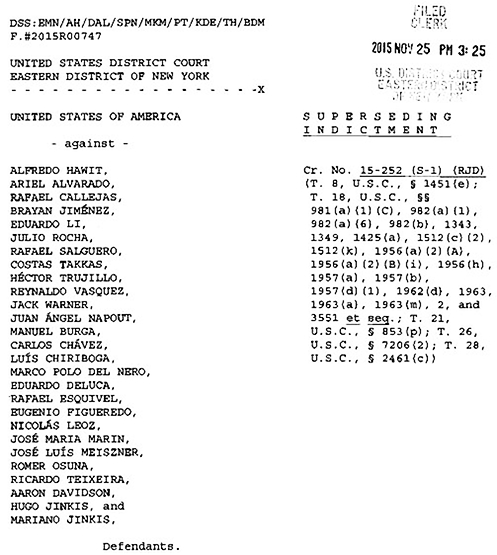
Starting in May of 2015, the US Department of Justice began to feed data to their counterpart, Panama’s Public Ministry, about persons and institutions in Panama that were involved in a series of bribery, kickback and money laundering schemes to enrich themselves by siphoning off some of the proceeds from the enormously profitable worldwide soccer scene. These schemes were carried out via its global governing body FIFA and various regional institutions that include CONCACAF, the federation for North America, Central America and the Caribbean.
(Is it proper journalism to say “allegedly” here? As to certain parties, perhaps. But a string of convictions, many on guilty pleas, erases any real doubt that these schemes and criminal acts to further them actually did happen.)
One of several points touching upon Panama and its federation was the claim that in 2010 and 2011 Ariel Alvarado, then president of the Panamanian Football Federation (FEPAFUT) and holder of various positions in CONCACAF and FIFA, had in a division of graft turf with other international soccer officials and corrupt companies arranged to take a bribe. A company called Traffic USA would pay a bribe of $70,000 to Ariel Alvarado to get the broadcast rights for Panama’s ultimately unsuccessful campaign to qualify for the 2014 World Cup, which was held in Brazil. The payment was routed through law firms, front companies and financial institutions in Miami and Panama, but Uncle Sam had the electronic mney trail all recorded. With some top FIFA officials charged and flipped to turn state’s evidence, then a series of raids in several countries, most notably Switzerland and the United States, a damning case was assembled against Alvarado.
But word was out that charges were coming down and Alvarado stayed put in Panama, whose constitution forbids the extradition of citizens to other countries.
Fair enough. Selling out our beloved Marea Roja for a bribe is also a crime here. Information was forwarded to Panama, whose prosecutors took nearly two years to bring Panamanian charges in April of 2017. Alvarado was jailed pending trial on bribery, fraud, money laundering and conspiracy charges.
But 18th Penal Court Judge Baloisa Marquínez has thrown out all but the money laundering charges. The $70,000 payment took place in a July 21, 2010 bank transfer, and she ruled that under the statute of limitations, the formal investigation of this crime began too late. Money laundering is under different rules and in any case appears to be have continued well after the bribe was paid, so those charges remain outstanding. But it is almost unheard of for any Panamanian to be convicted of money laundering in Panama.
Prosecutors were given three days to appeal the case’s dismissal and said that they would do so.
The US charges against Alvarado are still outstanding, which will likely keep him in Panama because if he goes to a third country he might be arrested on an INTERPOL warrant and extradited to the United States. One big difference between US and Panamanian law is the existence of tolling statutes to offset statutes of limitation. If a defendant is a fugitive, or in a jurisdiction beyond the court’s reach, or if she or he has concealed a crime for a certain period, those times are ordinarily not counted toward the running of the statute of limitation under US law. Under Panamanian law, concealment and hiding for long enough extinguish a case.

As the US Federal Communications Commission takes up a formal proposal to reverse the Obama-era Open Internet Order, a key question consumers and policymakers alike are asking is: What difference do these rules make?
My research team has been studying one key element of the regulations — called “throttling,” the practice of limiting download speeds — for several years, spanning a period both before the 2015 Open Internet Order was issued and after it took effect. Our findings reveal not only the state of internet openness before the Obama initiative but also the measurable results of the policy’s effect.
The methods we used and the tools we developed investigate how internet service providers manage your traffic and demonstrate how open the internet really is — or isn’t — as a result of evolving internet service plans, as well as political and regulatory changes. Regular people can explore their own services with our mobile app for Android, which is out now; an iOS version is coming soon. We’re working with the French equivalent of the FCC to promote our measurement tools in France to help audit whether French ISPs are compliant with local net neutrality protections. Other countries, including the United States, could follow the French lead, using our tools to evaluate their internet service quality.
Rules take effect
Before the Open Internet Order took effect in 2015, companies running cellular networks were allowed to use throttling to manage how much data their networks needed to handle at any given time. To do this, some companies capped users’ download speeds, which could cause video to stream at lower quality, with less-sharp images that were blurry during action sequences.
But there were limited rules governing how the mobile companies enforced those caps: We found some providers slowing down YouTube videos but not Netflix or other video services. This is an example of a major concern net neutrality supporters have: that internet providers might give preference to traffic from one site or another — perhaps making video providers pay extra to have their material delivered at high speed. If the speed or quality consumers can get from an online service depends on how much providers can afford to pay, that can put startups and innovators at a disadvantage to existing internet giants.
When it took effect, the Open Internet Order allowed internet providers to use throttling in only a limited way, under the so-called “reasonable network management” provision. Instead of singling out specific types of data for throttling, mobile companies — and wired internet providers as well — were required to do so in a way that treats all traffic equally. We observed the companies that had slowed down YouTube but not Netflix shifting their policies to reflect this new requirement.
The return of throttling
In late 2015, though, T-Mobile announced a program it called “Binge On,” departing from its competitors by offering its customers “free” video streaming — the ability to watch some video services on their devices without counting against monthly high-speed data limits. The trade-off was that their video quality from those providers would be limited in the best case to the equivalent of a regular DVD — not the high-definition video most people have come to expect, and which mobile data networks are capable of carrying. Some video sites would come in at higher quality, but their data would count against users’ monthly caps. Other sites’ videos, strangely enough, would come in at low quality, though the data would still count against users’ monthly caps.
When my team heard the announcement, we were perplexed. It seemed clear T-Mobile was throttling, perhaps even preferentially, choosing a handful of services to exempt from users’ monthly data caps, while continuing to count data from other video providers. And many users were opted in by default, potentially never knowing that T-Mobile had decided for them whether they could stream high-quality video. But most confounding, how did T-Mobile know what “video” was, as distinct from other data flowing through its networks?
Internet traffic is broken up into small chunks of data called “packets” that travel through the wires separately and then are reassembled by the computer or mobile device that’s receiving them. Think of these as small messages in individual envelopes traveling through the mail. In both cases, the packets and envelopes reach their destination according to the address written on the outside — not what is contained inside.
It would be strange if the US Postal Service looked at the envelopes, guessed what was inside, and decided your credit card bill should be delivered first, but delayed your paycheck. Unlike some envelopes, packets coming from YouTube or Spotify don’t carry information on the outside declaring what’s inside — say, “video” or “music streaming” or “web.” To the internet, they all look the same. And under the principles of net neutrality, they should all be treated the same.
Unequal handling
Through a set of rigorous experiments, we were able to find out how T-Mobile and other internet companies tried to tell the difference between video packets and packets containing other types of data: They were looking inside the packets — inside the envelopes — for particular words or terms, like “netflix.com” or “googlevideo.”
Someone had come up with a list of hints that indicated a particular piece of network traffic was in fact part of an online video. But of course there are countless video streaming platforms — and old ones die off and new ones are started every day. T-Mobile’s list couldn’t possibly cover them all.
We found that the popular video service Vimeo was not throttled by T-Mobile or Verizon. This meant that people who streamed Vimeo content used up some of their monthly data cap, but got better video quality than people watching YouTube or Netflix. This decision by T-Mobile — though it passed a review by the FCC — affected how well YouTube and Netflix could compete with Vimeo, which raises a specter of more problems to come if the FCC scraps the Open Internet Order (which, for all these reasons, I have urged them not to). What, for example, would stop AT&T from giving its DirecTV subsidiary faster and better-quality traffic than it gave competitors Netflix and Hulu?
Protecting consumers
One way to ensure users get the service they’re expecting — and paying for — is to require more transparency from internet providers. Specifically, they should disclose how much they slow down video and what that does to video quality, but also what hints or techniques they use to detect video traffic in the first place.
In addition, those methods must ensure that internet companies treat all content providers equally — so users don’t get better or worse performance from different sites based on corporate interests or disputes. And regulators need to enforce these basic rules, using auditing tools like the open-source ones my research team has developed.
![]() Editor’s note: This is an updated version of an article originally published Sept. 29, 2017.
Editor’s note: This is an updated version of an article originally published Sept. 29, 2017.
David Choffnes is and assistant professor of computer and information science at Northeastern University
This article was originally published on The Conversation. Read the original article.

Law 17 of November 12, 2017 — “About Cycling Mobility in the Republic of Panama” — has been passed by the legislature, signed by the president and published in the Gaceta Oficial. It makes a sweeping promise: “This law establishes norms to guarantee and favor non-motorized mobility.” The implications, mostly not stated, can go farther yet, into cleaner air, Panama’s standing in the global effort to reduce carbon emissions, tourism promotion and the health of people who live here. But there are pitfalls and drawbacks — our tropical sun, rainy season, maleantes, competing interests and squabbles to come over potential profits.
Thus the central part of this law is not the general principles espoused, but the mandate that all municipal districts have one year to come up with their plans to establish bicycle paths; created racks for bicycle parking; make connections among bicycle transportation, sidewalks an public transportation; and establish zones where motor vehicles will be excluded. The standards for the mayors’ plans will be set by the housing and environmental ministries and the land transportation and transit authorities. The latter authority and the ministry of education will be in charge of publicizing and popularizing bicycle transportation. The last week of every January — when tourist season is going full blast and most schools are out of session — will be Bicycle Week, with activities around Panama promoting the culture.
There are several things that are not in the law, but to the extent that it succeeds in any great measure will become apparent. A national bike path system that gets cyclists out of the way of the fumes and hazards of the Pan-American Highway, and if well done becomes an international tourist attraction, is an intuitive “next step.” Bicycle racks that are protected against thieves and vandals will make consultations with the police advisable. Police protection and emergency services are problems that can be anticipated from experiences like the robberies in some of our national parks around Chilibre, and from the day-to-day work of the ATTT responding to accidents. Perhaps the nation’s emergency room physicians will have some words of advice. Then there are other forms of transportation that would be worth incorporating — bicycle racks at airports and boat landings, for two examples. But for now the emphasis is on incorporating bicycles into the mix of people getting to and from school, work and recreational activities within specific municipal areas.
Anton district includes many of the beach developments, the mountain community of El Valle, an underused airport and a lot of places where most elementary school kids get to and from their classes on bicycles and students in the higher grades would benefit from bike racks at their bus stops. It would have a different set of problems and opportunities than Panama City or San Miguelito, districts where good commuter interfaces between cyclists and the Metro trains stand to be a major challenge. If, as reported, a Chinese-built commuter train system from the metro area to the Costa Rican border will be in the works, lessons learned in the city may affect planning in the Interior. Figure, then, that Law 17 not only has studies as its main feature, but is itself a transitional experiment, the results of which may guide future legislation.
Unless the project is stillborn, people will see the economic opportunities. There may be upscale business owners who want to keep “those people” away, but a spot next to a public bicycle rack may be highly prized by somebody who makes a living running a fonda. Will Odebrecht get a no-bid contract, inherently overpriced to cover the cost of kickbacks, to build a fabulous new bike path system? What about rest stops — shelters from the rain, lavatories, water fountains, places where one might repair or replace a tire — along the way? Might multiple uses for facilities, such that people who are present for other activities so that vandals and thieves can’t work unseen by people who are around for other purposes, lend a layer of protection to bicycle riders as they simultaneously create business opportunities?
In politics studies have various uses. Often there is a problem with an obvious solution that will offend someone whom politicians do not care to offend, so a study is a way to look concerned while avoiding any real action. But then there are times when politicians want to do something that has many implications, and they want to do it right. There may be as many approaches are there are municipal districts in Panama, but it seems that Law 17 aims at actually doing something and doing it as well as possible.
by Tulsi Gabbard
The Keystone Pipeline just spilled 210,000 gallons of oil in South Dakota, near the Lake Traverse Indian Reservation. Clean up crews are racing to protect surrounding wetlands, aquifers, and land, but the worst damage has already been done. The pipeline should never have been operating in the first place.
We cannot afford to wait for the next oil spill. Become a citizen co-sponsor of the OFF Act so that we can reach 100% clean energy by 2035.
The Sisseton Wahpeton Oyate tribe, who remain vehemently opposed to the pipeline, will be the ones dealing with the long-term repercussions of this spill, not TransCanada and big bank executives. It was for reasons like this that thousands of people traveled to the Oceti Sakowin camp at Standing Rock, just a few hours north of where this spill occurred, to oppose the Dakota Access Pipeline last year.
Meanwhile, the corporate giveaway tax bill that just passed the House would eliminate tax credits for electric vehicles and solar energy, while cutting credits for wind power by one-third and eventually phasing them out completely—yet it protects $14 billion in federal subsidies to the fossil fuel industry and makes them permanent. This is unacceptable, and this oil spill is yet another example of how dangerous Big Oil is to the health of our planet and our future. We should be investing in the technology of the future now, not paying corporate welfare to prop up a poisonous industry.
Donald Trump, Scott Pruitt, and other friends of the fossil fuel industry will compromise the health of our people and our planet to secure greater profits for their corporate friends. We need your help to make sure that doesn’t happen.
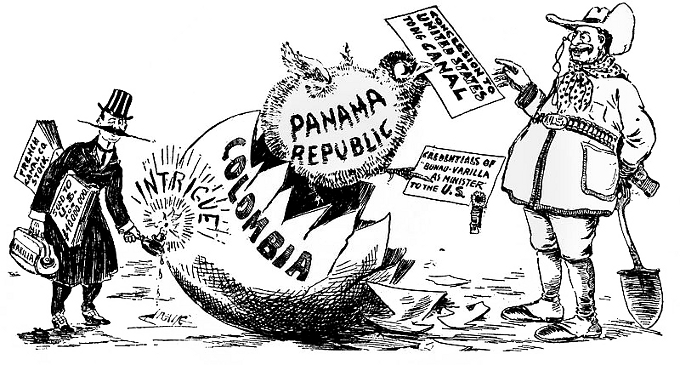
Suele afirmarse que durante el siglo XIX Panamá luchó por separarse de Colombia, y que la evidencia son las “actas separatistas”. La mayor parte de lo dicho respecto a estas actas ha sido acado de contexto por una historia leída de manera provinciana, perdiendo la perspectiva del conjunto de lo que ocurría en Colombia, para dar un toque de legitimidad a la separación de 1903.
No negamos la existencia de graves contradicciones en Colombia del siglo XIX, sino que es importante esclarecer la verdadera índole de aquellos conflictos. Un análisis de las circunstancias muestra que, más que un conflicto “nación panameña” vs “nación colombiana”, son producto de las contradicciones políticas y sociales que se abatían sobre el país tal como quedo plasmada en los siguientes hechos:
El Acta de 1821
Algunos afirman: que Panamá proclamara su independencia de España en 1821, sin intervención de los ejércitos bolivarianos, siendo una prueba de que constituíamos una entidad independiente, reafirmado por la adhesión voluntaria a la Gran Colombia.
Quienes así hablan olvidan que: 1. Panamá estaba adscrita, desde 1739, al Virreinato de la Nueva Granada; 2. El Istmo era una región debilitada económica y demográficamente que no podía sostenerse sola como estado independiente; 3. Que la Villa de los Santos llamó a los ejércitos de Bolívar a hacerse presentes, y que esto obligó a José de Fábrega a sumarse a la independencia.
El Acta de 1826
Se la presenta como el primer esfuerzo separatista, sin embargo, no hay nada de eso. Ese año, Simón Bolívar retorna a Bogotá desde Bolivia y Perú con un proyecto de nueva Constitución Política que, entre otras cosas, le nombra presidente vitalicio. Como Santander se oponía, Bolívar pidió respaldo mediante un pronunciamiento.
El Acta de 1826 no es una proclama independentista, sino política, y expresa la disputa entre dos partidos (santanderistas y bolivaristas). También los hechos reflejan que en Panamá hay una incipiente contradicción social, entre el pueblo y los notables (comerciantes). Lo único que tiene de particularismo local es el librecambismo de los comerciantes istmeños.
El Acta de 20 de septiembre de 1830
Año en que Bolívar renuncia a la Presidencia. El general panameño José D. Espinar realiza un acto de insubordinación frente a los que se apoderan del gobierno. El móvil de Espinar era exigir el retorno de Bolívar al gobierno. El artículo primero proclama la separación “especialmente del Gobierno de Bogotá”.
El segundo: “Panamá desea que su Excelencia el Libertador Simón Bolívar se encargue del Gobierno Constitucional de la República, como medida indispensable para volver a la unión de las partes, de ella que se han separado bajo pretextos diferentes, quedando desde luego este Departamento bajo su inmediata protección”. Tercero: “Panamá será reintegrada a la República luego que el Libertador se encargue de la Administración o desde que la Nación se organice unánimemente de cualquier medio legal”. El considerando alude a una circular emanada de Bogotá para que “los pueblos manifiesten sus deseos”.
El considerando recoge el reclamo de los comerciantes istmeños, no de una separación, sino la queja de que al separarse las provincias del sur (Ecuador y Perú) se habían afectado las relaciones mercantiles. Este tipo de reclamo es la tónica real de las clases dominantes en el Istmo, no la construcción de una nación independiente.
El Acta de 1831
Como los notables (comerciantes) del “intramuros” eran hostiles a Espinar, por motivos políticos: (él era bolivarista, ellos santanderistas); sociales (él expresaba al sector plebeyo del ejército, ellos las élites comerciales); raciales (él era mulato, ellos blancos), promovieron que el general Juan E. Alzuru se sublevara y deportara a Espinar.
El 9 de julio de 1831 se proclamó una nueva acta. En los considerandos uno y dos nuevamente se arguye el problema de las relaciones comerciales con Nueva Granada. Pero la proclama no habla de “independencia” sino que (art. 1) “Panamá se declara territorio de la Confederación Colombiana y tendrá una administración propia…”.
Se proclama un estado federado, reafirmado por el artículo tercero que señala que los “tres grandes Estados de Colombia disfrutarán de todas inmunidades comerciales que se conceden a los istmeños”… (a cambio del mismo trato); “siendo un pueblo de la familia colombiana” (art. 4); ofrece el territorio para que sea la “residencia de la Confederación”, capital política (art. 5); y conserva la Constitución, leyes y símbolos de la república “en prueba de amistad y amor hacia la Nación a que espontáneamente se unió” (art. 7).
Pero Alzuru estaba lejos de representar los intereses de los comerciantes ya que, como militar, también era bolivarista. Le correspondió nada menos que al general Tomás Herrera, enviado con 200 soldados desde Bogotá, aplastar al régimen de Alzuru y fusilarlo.
El Acta de 1840
Es imposible entender el Estado Libre o Soberano del Istmo (1840-41), proclamado por Tomás Herrera, sin la perspectiva general de la guerra civil que asoló a Colombia y se llamó la guerra de “Los Supremos”. Al igual que Herrera en Panamá, proclamaron otros tantos “estados libres”: González en el Socorro, Reyes Patria en Sogamoso, Carmona en Santa Marta, Troncoso en Mompox y Gutiérrez de Piñeres en Cartagena.
Por ello el Acta del 18 de Noviembre de 1840, redactada por Tomas Herrera, considera que dada la “disolución” de la república producto de la guerra (art.1); proclama el Estado Soberano (art.2); condiciona su reintegro a la Nueva Granada bajo un régimen federal (art.3); y establece el carácter “provisorio” de las nuevas autoridades.
Veraguas, dirigida por Carlos Fábrega, se opuso a esta proclama. En marzo de 1841 se reunió una Convención Constituyente del Istmo que, a instancias de Herrera, mantuvo la voluntad de adherir a una Nueva Granada federal, rechazando el centralismo (art. 2).
Conclusión
Presentar estas actas políticas como “separatistas”, borrando el contexto que las explica, ha sido una obra de la historia oficial panameña para dar un toque de legitimidad a la separación de Colombia en 1903 y maquillar la intervención de Estados Unidos para imponer el Tratado Hay-Bunau Varilla.
.
Bibliografía
1. Araúz, C. y Pizzurno, P. El Panamá colombiano (1821-1903). Panamá. 1993.
2. Lemaitre, Eduardo. Panamá y su separación de Colombia. Ed. Pluma. Bogotá, 1980.
3. Terán, Oscar. Del Tratado Herrán-Hay al Tratado Hay-Bunau Varilla. T. III, 2da. Parte. Panamá, 1935.

Will the membership of the US Senate be decided on the basis of improper sexual conduct by men? Could be. The men of neither party are totally innocent and pure, and that’s not a reason to dismiss the complaints as of no practical consequence. Americans are at an uncomfortable social moment when changes must be made in the culture.
Will the next Panamanian National Assembly have a new contingent from an Evangelical political party? Ah, but we know this particular crowd of Evangelicals — who should not be taken to represent ALL Evangelicals — and we have seen their interactions in politics. It’s sordid stuff.
Some years ago the Catholic Church got institutionally sick of the “God’s representative in secular politics” pretense and banned most political activity by its priests. Some good men like Father Drinan, the Democratic representative from Massachusetts, had to retire. But of course both Testaments of the Bible are full of tales of political stands by men trying to adhere to God’s guidance and the Vatican still finds itself taking stands on controversial political issues, even if its priests can’t run for office on such stands. And still, an Archdiocese of Metro Panama that took from Richard Fifer of the Petaquilla gold mine scam also is shown to have taken from the Brazilian criminal conglomerate Odebrecht and the archbishop’s plea that the church did not know has the thud that inspires incredulity rather than the ring of truth.
God isn’t on the ballot. Not in the special election in Alabama, not in the 2019 general election in Panama. The values and judgments of believers of all denominations — and of those whose value systems are non-religious — will play large roles in all of those decisions and they should. On basic questions like about how it’s wrong to steal, to take bribes, to oppress those with different beliefs, most of the faithful of the different religions tend to strongly agree. There is a common denominator of ordinary decency. There will be different opinions on various issues and there are rival political tribes, but the underlying value of decency, stripped down to its essentials, ought to have an important role in our decisions.